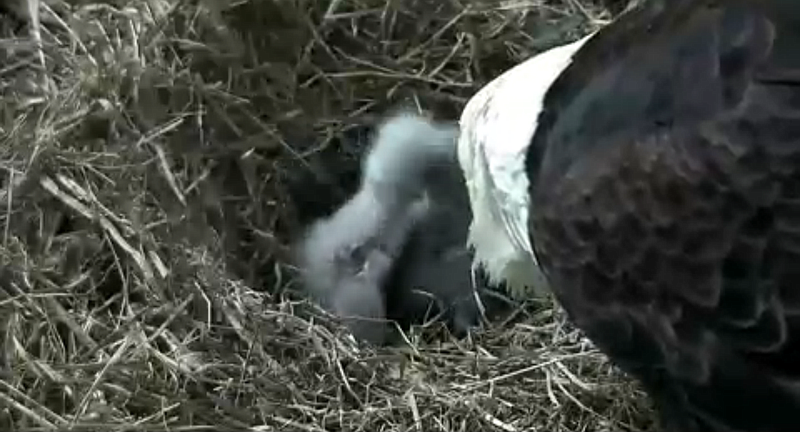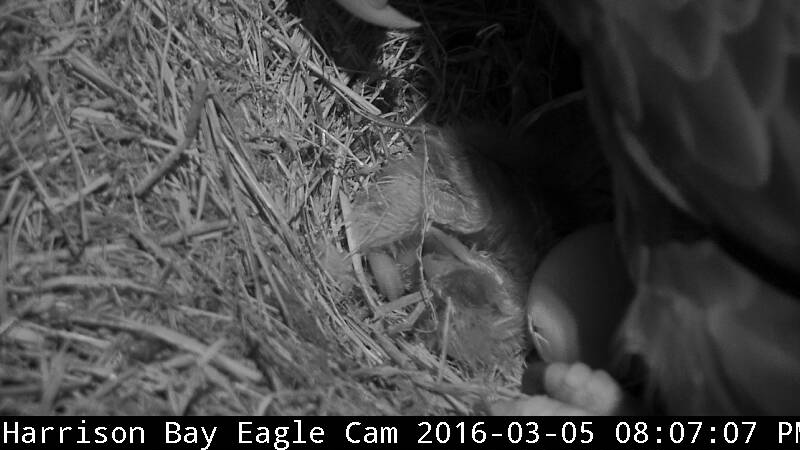UPDATE: HB9 and HB10, the two Harrison Bay baby eagles, have both hatched. The first egg hatched about 7:30 p.m. March 5, 2016.
Pam Sohn's editorial for the March 5 Chattanooga Times:
Any time now, Elliot and Eloise Eagle will be proud parents.
Their babies already are named: HB9 and HB10.
If that seems somewhat lacking in imagination, don't worry. You won't need your mind's fancy to see these baby bald eagles hatch, grow and fledge from their Harrison Bay nest on Bear Trace Golf Course.
You can watch it all - 24 hours a day - on the best reality show ever.Just tune in with your smart phone or computer or tablet to harrisonbayeaglecam.org - or jump there from the Times Free Press web page.
But you'd best grab your seat and set your browser bookmark today or certainly over the weekend if you want to see the hatch. At least one egg already has a tiny peck-through - known in birder-world as a pip. It can take a few hours or as much as three days to complete the hatch, as each 3-ounce hatchling has to exert a tremendous amount of energy to use its "egg tooth" to break away enough shell to push its way out.
Paul Carter, the Bear Trace Golf Course superintendent, said the eagles built their nest in December of 2010, and the first hatch of two eggs - HB1 and HB2 - soon followed.
There was no camera then. That didn't come until Harrison Bay park rangers were surprised by how fast the eaglets grew and fledged (compared to others in more northern climes). Right then, park officials decided a camera was a great idea for research.
Carter said it also was a great idea for the golf course. How better to counter the bad environmental rap some golf courses have gotten over the years because of pesticides and herbicides?
"We figure if a pair of eagles decides the golf course is a safe and suitable habitat for raising a family, then we must be doing something right," Carter said. "We still use pesticides and herbicides, but we're very conscious about what we're doing and how much we're doing. The (Tennessee) Department of Environment and Conservation manages our course, so [conservation] is in the mission statement."
He's right, of course. And Bear Trace has plenty of environmental awards.
Eagles mate for life, and barring unusual circumstances they return to the same nest every year, according to Park Ranger Matt Vawter. Elliot and Eloise have raised babies at Bear Trace every year but one - a year of many tornadoes. That year, there were no offspring.
Seven volunteers operate the focus and camera angles of the sophisticated camera that records every move in the nest, as well as a ground camera that shows the adult eagles as they leave and approach the nest tree. The volunteers also host a chat room on the harrisonbayeaglecam.org website. At one point on Friday, 128 computers were tuned into the live stream, some in classrooms.
Vawter said Elliot and Eloise (named by Carter's daughter) host Tennessee's only eagle nest in the wild reality show. But that's not even the half of what makes them so special.
Back in 1961 - just over 50 years ago - there were no active bald eagle nests in all of Tennessee. None. In fact, there was not a known bald eagle nest in the Volunteer State again until about 1983. So, camera or no, it's pretty special to have this couple nesting right here for the past seven winters.
"That was something people thought was a thing of the past," he said. Now there are more - and Elliot and Eloise are very likely contributing to that.
As for the research angle, Vawter said he plans soon to work with a local entomologist, a bug expert, to zoom in on the eaglets' cradle to learn more about the special ecology that a nest itself creates and fosters.
But the real value, he wisely notes, is what the camera's non-invasive invasion of eagle privacy offers to all the rest of us - the ordinary people gazing transfixed in watching these regal and iconic birds.
"The primary value it has is inspiring us to care," Vawter said. "Because people just don't care about things that they're not familiar with. And things that are more personal to us, we naturally take better care of."
So tune in. And behold, the bald eagle and nature's beauty - right here in our own backyard.

